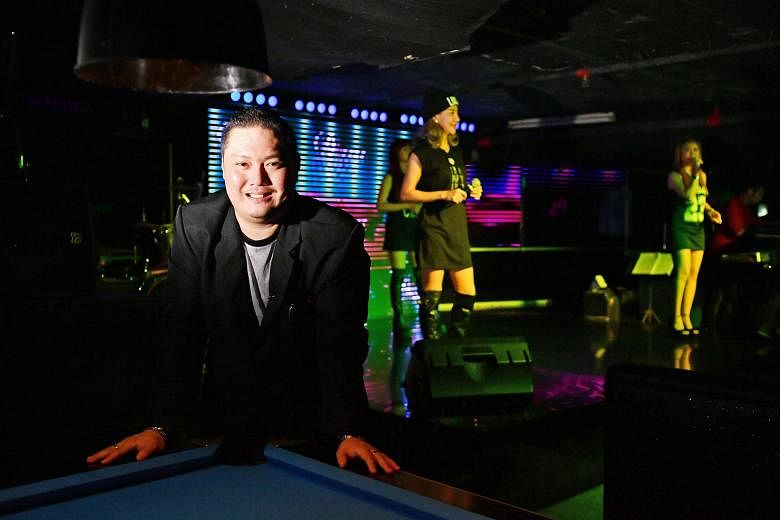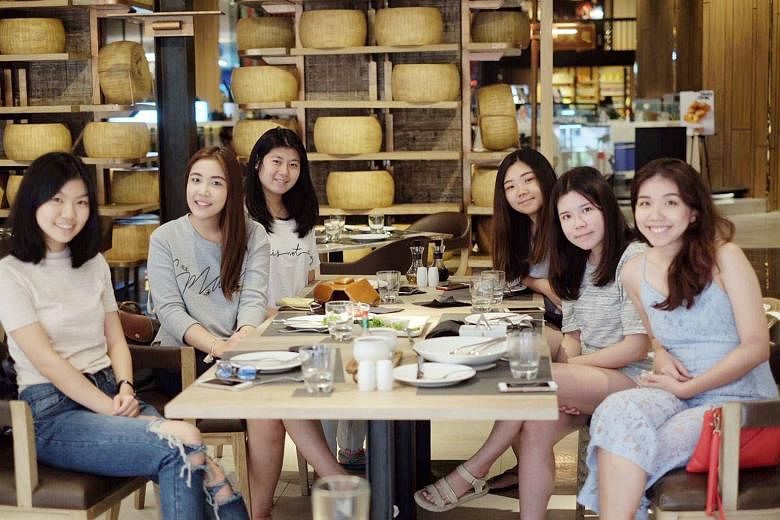Golden Mile Complex, Singapore's "Little Thailand", is more than just a hot spot for Thai nationals.
There is a thriving community of people of different nationalities who have immersed themselves in the Thai culture, and are fluent in its vernacular.
Tucked in the basement of the building is Diva Disco, a siam diu or Thai disco, where the majority of the patrons are Singaporeans.
Singers entertain patrons with song and dance, sometimes in the form of a variety performance.
Manager Leon Loh, 37, picked up the language eight years ago when he started working at the nightclub. He had been struggling to communicate with his Thai colleagues.
"I always had to guess what they were saying," said Mr Loh, who is now married to a Thai national.
"So I started paying more careful attention to their conversations and made a conscious effort to speak to them in their language."
At other times, he turned to online translation tools to learn the Thai script.
-
67m
Number of speakers of the Thai language globally.
47,000
More than this number of native Thai speakers living in Singapore.
50
Number of candidates sitting for the Thai GCE O-level examination in each of the past three years.
Though not always accurate, he said that Google's speech-to-text function and using a Thai keyboard helped. He said his motivation to learn the language goes beyond the nature of the job.
"You must also have an interest in the culture," he said.
Like all languages, the Thai language is inextricably tied to its culture and values, which emphasise respect for the elders. When addressing a person in a position of seniority, speakers use the word pee.
-
Facts and figures
-
ORIGINS
The official language of Thailand, Thai (or Siamese) is part of the Tai-Kadai group of languages. Laotian - which is spoken in Laos - and Shan, a minority language in Myanmar, count as members of this language family.
The writing system of the Thai language can be traced back to the 13th century, following the discovery of the Ram Khamhaeng Stele.
There are four main dialects of the Thai language: Standard Central Thai, Thai Isan (or the North-eastern dialect), Kham Muang (or the Northern dialect) and Pak Tai (or the Southern dialect). They differ in their vocabulary, grammar, tones and sentence structure.
NUMBER OF SPEAKERS
Some 67 million people speak the Thai language globally. Most come from Thailand, followed by the United States, South Korea and Australia.
In Singapore, there are more than 47,000 native Thai language speakers, based on a 2012 census by Thailand's Ministry of Foreign Affairs. While no official data is available on the number of Singapore Thai speakers, about 50 candidates took the Thai GCE O-level examinations each year in the past three years, according to the Ministry of Education. The examination has been conducted since the 1970s.
WHERE TO LEARN IT
Many language schools and universities conduct Thai language courses for students at varying proficiencies.
This includes the inlingua School of Languages and the National University of Singapore's Centre for Language Studies.
Those who are interested can find more information at www.inlingua.edu.sg/languages/thai or www.fas.nus.edu.sg/cls/courses/thai.html.
For example, Pee krup, ponlamaai ra kha thaw rai krup, is used when asking an elderly fruit seller how much the fruits cost.
Polite particles - such as ka (used by a woman) and krup (used by a man) - are also used to punctuate sentences.
For 22-year-old undergraduate Chen Xiaohan -a fan of Thai language movies, which she watches with English subtitles - the decision to learn the language came only after a first experience in Thailand in 2014.
"When I went there, the people were very warm and welcoming," she said. "From then on, I became interested in its people and culture."
This she attributes to sanuk, a term which can be loosely translated to mean having fun. Deeply rooted in Thai culture, it informs its people's outlook on life and is intrinsic to their way of living.
So when she entered university, Ms Chen signed up for Thai language electives, and even went to Bangkok for a six-month exchange programme in her third year.
"When I was there, I asked my friends to teach me their slang," she said.
"A lot of the words in the textbook are quite formal and not used colloquially. From them, I learnt how to speak in a more casual way."
Ms Kay Phirotrat, who teaches Thai at inlingua School of Languages, said that there are a variety of reasons why students in Singapore learn the language in schools.
"They may have a spouse or parent who is Thai, or are pursuing career opportunities in Thailand, or studying religious and cultural subjects there," she said.
They include Ms Clarissa Tan, 24, who works in the design industry. She started learning Thai last July.
Among other reasons, she is learning the language in the hope of understanding Buddhist teachings better when she travels to Thailand for meditation.
"A lot of these teachings are written in Thai, so if I'm able to read the language, it would definitely help me in my meditative journey," she said.
There are others such as hairdresser Lim Sew Yok, 58, who acquired the language informally.
Operating in a small salon in Geylang, she had served many Thai customers in the course of her 40-year career.
"Many of them come to Singapore without having any knowledge of our language," said Ms Lim. "Sometimes they would ask me for a particular hairstyle, so it is good to know a few words to be able to give them what they want."
Over time, she became proficient in the language, with her friends even joking that she could have been Thai in her previous life.
She described her approach as having "no system", picking up bits and pieces of the language while listening to waiting customers, and scribbling notes on scrap paper.
Like Ms Lim and many Thai language learners, it is an organic and unfettered approach to learning the language which brings them closer to the country.
"It's always nice when you go to a country and the local people know that you can speak their language," said Ms Chen.
"They will be more friendly and they know that even though you're a foreigner, you have still made the effort to learn their language."


